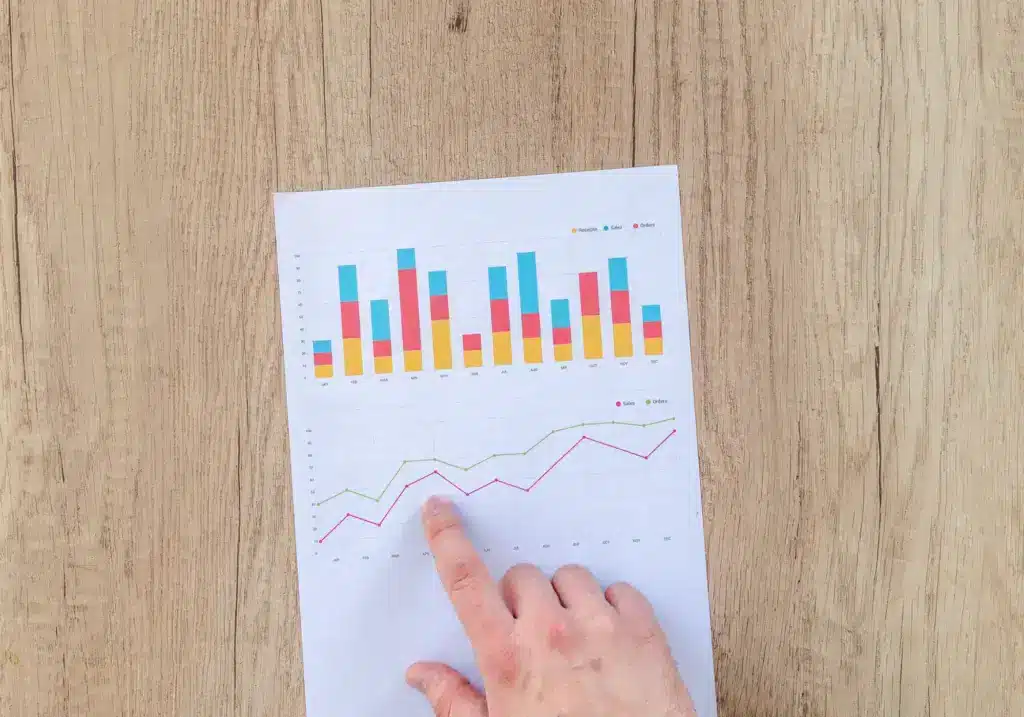If you think property flyers are old-school, you’re not alone. I’ve heard agents say, “Everything’s online now—why bother with paper?” But here’s what I’ve seen after decades in the business: when the flyer is done right, it’s the piece buyers take home, pin to their fridge, or hand to a friend. And that keeps you in the conversation long after the showing is over.
I remember reviewing follow-ups from an open house a few years ago. Beautiful home. Strong traffic. But half the agents and buyers walked out with a flyer that was little more than an MLS printout. No standout photos, no hook, no real call to action. Guess how many of those leads converted? Zero.
That’s when I started treating every flyer like a strategic asset, not a formality. And once I paired sharp design with clear messaging and digital tracking—things changed.
Over the years, I’ve learned that a great property flyer is more than just a handout. It’s a conversion tool. It’s something a buyer reads later when their adrenaline drops and they’re deciding whether to call you. It’s a signal to sellers that you’re a pro who knows how to market. It’s even a farming piece when used right—building your name in a neighborhood long before they’re ready to list.
In this guide, I’m going to walk you through everything I’ve learned about property flyers—from strategy to layout, templates to tracking—and how to use them to actually drive results.
What a Property Flyer Really Needs to Do
Let’s be clear—your flyer’s job isn’t to sell the property. It’s to start the conversation.
I see a lot of agents trying to cram an entire MLS sheet onto an 8.5×11 flyer. Square footage, every bedroom photo, six bullet points about kitchen upgrades, and a headshot the size of a grapefruit. That’s not marketing—it’s clutter.
A strong property flyer should do three things:
- Catch attention quickly
Whether it’s pinned to a community board, handed out at a showing, or left on a doorstep, you’ve got seconds to hook someone. That’s where a headline and one compelling image do the heavy lifting. Think:
“Sunset Views Every Night—See Inside This Hillside Hideaway”
Not: “4 Bed, 3 Bath, 2,100 Sq Ft, Built 2005”
- Spark curiosity
The goal is to make the reader want more. That might mean scanning a QR code, texting you, or flipping it over for details. You don’t need to say everything—you just need to say enough to create movement.
- Direct them to act
Include one clear call to action. And by clear, I mean frictionless. “Text ‘INFO’ to [number],” “Scan for full gallery,” or “Tour this Sunday 1–4.” I’ve tested flyers with and without CTAs, and the ones with a direct, simple next step always outperformed.
Design and Layout: What Makes a Property Flyer Look Professional
Let’s cut through the noise: your flyer doesn’t need to look like it was designed by an ad agency. It just needs to look clean, clear, and intentional.
Early in my career, I thought “design” meant cramming in fancy fonts and gradients. I spent hours in WordArt mode—seriously. Then I started studying the flyers that actually got picked up and kept. The common thread? Simplicity and focus.
Here’s the formula I use for nearly every property flyer layout:
The Core Property Flyer Layout Blueprint
Section | What to Include |
Header | One powerful headline (benefit-driven), NOT the address |
Hero Image | One standout photo—usually the exterior, kitchen, or view |
Subheadline | Short line that expands on the headline (“Steps from the lake, fully renovated”) |
Details Block | The basics: beds, baths, square footage, price, address (clean, spaced, easy to skim) |
Bullet Highlights | 3–5 quick hits: hardwood floors, new roof, school zone, etc. |
Call to Action | “Tour this weekend,” “Scan for virtual tour,” “Text for price”—make it actionable |
Branding/Footer | Your logo, headshot, contact info—professionally placed, not oversized |

Property Flyer Design Best Practices I Swear By
- Use white space generously. It makes your flyer feel modern and high-end.
- Stick to 2 fonts max. One for headings, one for body. Sans-serif fonts like Montserrat or Open Sans work great.
- Align everything. Even spacing and alignment instantly elevate a flyer.
- High-res images only. Blurry photos = lost credibility.
- One dominant color. Match it to your brand—but don’t go rainbow. Color should guide the eye, not distract it.
I use Canva or Highnote for 90% of my flyers now. With pre-built layouts, I can duplicate, tweak, and export in under 15 minutes—and they look sharp every time.
Distribution Strategies That Actually Get Your Flyers Seen
Designing a sharp property flyer is just step one. If it never makes it into the right hands, it’s not doing its job. I’ve tested just about every flyer distribution method you can think of—from door drops to QR codes to digital-only formats. Some worked. Some bombed.
Here’s what consistently gets results, broken down by method, use case, and key tips.
Tried-and-True Listing Flyer Distribution Methods
Method | Best Use Case | Pro Tips |
Door Drops / Door Hangers | New listings, open house flyers | Focus on the 100–250 homes closest to the listing—neighbors are powerful referrers. |
Direct Mail Campaigns | Farming, sold listings, market updates | Use tools like Every Door Direct Mail or ProspectsPLUS! to target by ZIP code or income bracket. |
Open House Handouts | On-site at showings | Include a QR code that links to a Highnote flyer with more details and tracking. |
Local Business Placement | Brand awareness, community events | Ask coffee shops, gyms, and boutiques if you can leave a stack by the register. |
Event Flyers | Seminars, workshops, school/community events | Offer a value-based flyer (“Free Home Valuation” or “First-Time Buyer Kit”) with lead capture. |
Digital Distribution (Email / Social) | Expanding reach beyond physical space | Share via email blasts or social posts; format for Instagram or link to a Highnote presentation. |
How Highnote Enhances Flyer Distribution
This is where Highnote pulls ahead. You can build a flyer inside Highnote, then:
- Send it by email with a trackable link
- Embed video walkthroughs, PDFs, and calendar links
- Get notified when someone opens, views, or forwards it
I’ve used Highnote flyers post-open house to follow up with attendees and buyers who couldn’t make it. One time, a buyer opened the flyer presentation four times in two days. On the fifth day, they called me to write an offer.
That kind of insight lets you follow up when interest is hottest.
Measuring Performance—How to Know if Your Flyer Is Working
You’ve put in the work—designed a great flyer, distributed it smartly, followed up. But here’s the real question: Did it move the needle?
If you’re not measuring results, you’re just guessing. And guessing is a luxury busy agents can’t afford. I learned this the hard way after wasting a small fortune on beautifully printed flyers that looked great but produced zero leads. That’s when I started adding tracking layers—and everything changed.
Simple Ways to Track Flyer Performance
Tracking Method | What It Measures | How to Use It |
QR Codes with UTM links | Page visits, click sources | Generate unique QR codes tied to each flyer type or campaign |
Dedicated Landing Pages | Engagement rate per flyer | Send users to a flyer-specific page for open houses or listings |
Trackable Phone Numbers | Lead source attribution | Use services like CallRail or CRM-specific numbers for flyers |
Flyer-Specific CTAs | Lead conversion effectiveness | Example: “Text ‘INFO’ to 555-1234 for photos and pricing” |
CRM Source Tagging | Pipeline analysis by marketing type | Tag leads as “Flyer – Just Listed,” “Flyer – FSBO,” etc. |

Why Highnote Gives You an Edge
Traditional flyers go out—and that’s it. You hope someone calls. With Highnote, it’s different.
When you send a digital flyer via Highnote, you get instant feedback:
- Who opened it
- What they clicked on
- How long they spent reading it
- Whether they forwarded it
This transforms your flyer from a static one-pager into a live marketing asset. I’ve had clients open a flyer multiple times over a weekend—by Monday, I knew who was serious and who wasn’t.
Property Flyer Examples & Tools to Make Your Life Easier
The secret to creating high-quality flyers without wasting time? Start with a strong template—and stick to tools that work.
I used to build everything from scratch in PowerPoint (don’t judge). It was slow, clunky, and inconsistent. Once I made the switch to customizable templates, it was like flipping a switch. Suddenly, every flyer looked branded, balanced, and professional—and it took a quarter of the time.
Here’s what I recommend:
Top Tools for Creating Property Flyers
Tool | Best For | Why I Like It |
Highnote | Digital flyer + tracking and notifications | Lets you build a digital flyer and track who views it, what they click, etc. |
Canva | DIY design with full control | Tons of modern real estate flyer templates, easy drag-and-drop editor |
ProspectsPLUS! | Direct mail campaigns | Built-in printing + mailing tools for full campaigns |
Lucidpress (Marq) | Brokerages with tight branding | Lets you lock in brand guidelines across a team |
Standout Property Flyer Examples
What I love about Highnote isn’t just that the flyers look good—it’s that they work hard. They live online, are easy to personalize, and they track engagement so you know what’s landing.
Here are a few Highnote digital property flyers worth checking out:
A clean, modern layout built for commercial space marketing—professional and easy to navigate.
Ideal for rural or development land—this flyer leans into the space’s potential, not just the specs.
Urban luxury done right—sharp branding, minimal clutter, and a CTA that invites action.








